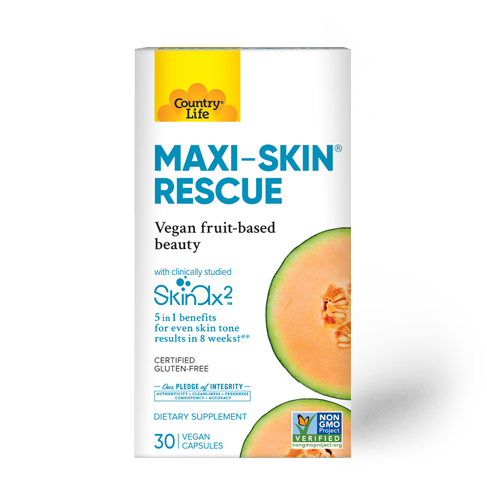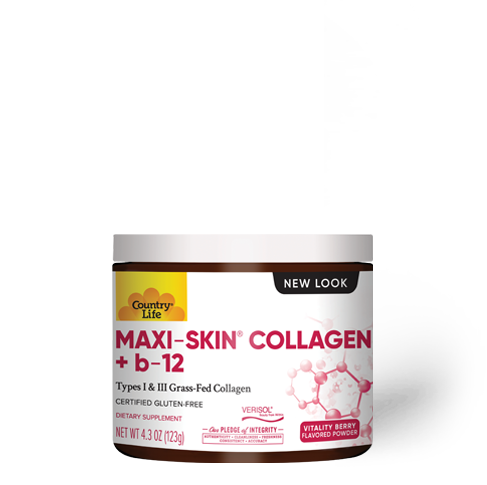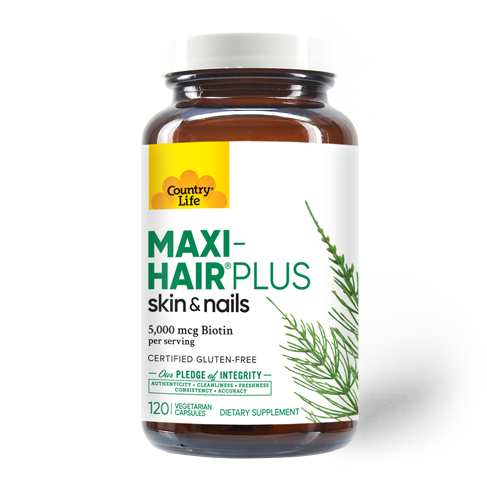Glowing skin, radiant skin, dewy skin… whatever you call it, almost everyone wants it.
Fortunately, achieving healthy-looking skin doesn’t require harsh chemical treatments or even investing hours in a complicated (and expensive) skin care routine.
Radiant skin is an inside and outside job, meaning nutrition and lifestyle count as much as skin care.
In this article, you’ll learn how to improve the appearance of your skin using simple skin care, nutrition, and lifestyle strategies, plus the best vitamins for skin health.
Why Do Some People Have Naturally Glowing Skin And Others Don’t?
Although it can seem like some people have naturally flawless skin, the truth is, there is no “perfect” skin.
Although media and social conditioning would have us think differently, “normal” skin has normal flaws, including:
- Visible pores
- Fine lines and wrinkles
- Uneven skin tone
- Dullness and dryness
- Redness
- Visible veins
- Broken capillaries
- Birthmarks
- Occasional blemishes and/or clogged pores
Even if you see someone whose skin seems naturally radiant, you can rest assured that they also deal with some of these normal flaws (just like everyone else).
So, while the quest for healthy-looking, glowing skin is valid, try to banish the idea of “perfect skin” because it doesn’t exist.
Instead, let’s focus on what you can do to increase your skin’s strength, glow, and resilience naturally.
The Best Skincare Routine For Glowing Skin
Although celebrity and influencer skin care routines may suggest otherwise, more is typically less when it comes to achieving glowing skin.
What does this look like?
- Using the right products for your skin type (normal, dry, combination, oily, mature)
- Choosing clean, natural, and sustainable skin care products that support healthy skin barrier function without hidden toxins
- Practicing daily cleansing, moisturizing, and sun protection.
- Avoid over-cleansing, which can strip the skin’s precious oils. Once or twice per day for less than one minute is plenty.
- Exfoliating two to three times per week (not every day!). Although exfoliating does create a beautiful glow initially, over-exfoliating can damage your skin, leading to dullness and other skin issues long-term
- Using other products, like facial masks, blemish spot treatments, etc., as needed
That’s it!
Cleanse once or twice daily, moisturize and wear sunscreen daily, exfoliate sparingly, and use your other products as needed.
Looking for clean, natural, and sustainable skin care products? Check out our sister company, Desert Essence’s skin care products for all skin types.
The Best Vitamins For Skin Health + Nutrition Tips
The “inside” part of achieving glowing skin refers to what we put into our bodies and how we care for ourselves.
Experts agree that a healthy, whole-foods diet rich in fruits, vegetables, lean proteins, whole grains, and healthy fats is essential for skin health.
Let’s unpack this, then discuss the best vitamins for skin health.
- Fruits and vegetables contain abundant vitamins, minerals, fiber, and active plant compounds, including antioxidants, which fight inflammation and may help reduce the signs of aging.
- Lean proteins give the body the building blocks to build and repair new and existing tissue. Our skin, hair, and nails are made up of protein! Protein also promotes healthy blood sugar balance, which can aid certain skin issues. So getting enough in your diet is essential for healthy, glowing skin.
- Whole grains, such as quinoa, millet, brown rice, and whole wheat, provide a healthy source of vitamins, minerals, and fiber, which help promote healthy elimination and detoxification.
- Healthy fats, like olive oil, avocado oil, nuts, seeds, fatty fish, and Omega-3 supplements, may help promote healthy skin barrier function and maintain moisture. Omega-3s also support a healthy inflammatory response, resulting in more even skin tone and preventing other skin issues.
Make room for more of these healthy foods (and less for processed foods), and you’ll start noticing a difference in your skin and overall health—a win-win.
The Best Vitamins For Skin Health
As outlined previously, eating a diverse and healthy whole-foods diet typically ensures that you get plenty of skin-loving nutrients.
For those times you can’t, a multivitamin or other supplements can help fill in any nutritional gaps.
Some of the best vitamins for skin health include:
- Vitamin C: Essential for collagen production and maintenance, this antioxidant vitamin may also help prevent signs of aging and sun damage, promote skin lipid function, support a healthy inflammatory response, and reduce occasional breakouts. Sources of vitamin C include citrus fruits, berries, broccoli, kiwi, bell peppers, and strawberries.
- Vitamin A: Critical for skin cell health and preventing skin cancer. Found in beef liver, sweet potatoes, carrots, spinach, kabocha squash, and butternut squash.
- Vitamin E: This antioxidant vitamin helps protect the skin from sun damage and may help maintain moisture levels and reduce signs of aging. Sources of vitamin E include: wheat germ, almonds, hemp seeds, sunflower seeds, peanuts, and peanut butter.
- Omega-3 Fatty Acids: These healthy fats may help prevent specific skin issues, maintain moisture and elasticity, promote a normal inflammatory response, and protect against sun damage. Sources of omega-3s include fatty fish, grass-fed beef, chia seeds, walnuts, and flaxseeds.
- Zinc: This mineral is essential for wound healing, fighting free radicals, supporting immunity, promoting a healthy inflammatory response, and may help reduce blemishes. Sources of zinc include oysters, beef, tofu, wheat germ, hemp seeds, and fortified breakfast cereals.
- B-vitamins: Various B-vitamins, including B2, B6, biotin, and B12, provide various skin health benefits, including preventing skin cracking, maintaining collagen levels, and promoting wound healing. Sources of B-vitamins include: whole grains, meats, poultry, fish, seafood, legumes, eggs, and dairy products.
- Magnesium: Also known as “the relaxation mineral,” magnesium has both direct and indirect benefits for skin health. For example, research suggests magnesium, such as Epsom salts, may help aid various skin conditions. Supplemental magnesium has also been shown helpful for promoting healthy sleep and reducing stress, two significant factors in skin health.Sources of magnesium include: leafy greens, legumes, mango, avocado, nuts, seeds, and dark chocolate.
Country Life offers a variety of multivitamins, B-vitamins, Omega-3s, Hair, Skin, and Nail supplements, and more for healthy, glowing skin and overall well-being.
Discover more about our vitamins and nutrients for skin health in: 6 Vitamins To Enhance Your Beauty Routine.
Lifestyle Tips For Healthy, Glowing Skin
Although often overlooked, lifestyle is an equal player in skin health.
Here’s how you can level up your lifestyle practices to enhance skin health, resilience, and natural glow.
1. Sleep More
The age-old advice to “get your beauty rest” has been vindicated by generations of grandmothers and modern science.
In fact, it may be one of the most powerful ways to enhance your skin’s health and natural glow.
When we sleep, our bodies remain active, cleaning up waste, repairing cells and tissue, detoxifying byproducts and environmental toxins, and building new skin cells.
So, if we’re not getting enough sleep (7 ½ - 9 hours per night), our skin will show it.
Research has shown just one or two nights of poor sleep can cause dark circles and sagging under the eyes, fine lines and wrinkles, dullness, and paleness.
Aim for 7 ½ to 9 hours of sleep per night, and you’ll notice a remarkable difference.
Related reading: The Dr. Audrey Series Q&A Format: The Importance of Sleep
2. Stay Hydrated
Healthy, glowing skin is hydrated from the inside out.
That means moisturizing daily and ensuring you’re drinking enough water.
Although water consumption and skin health research is in its infancy, studies suggest that drinking enough water (about eight eight-ounce glasses per day) can help promote optimal skin moisture and improve nutrient absorption, which benefits skin health.
Staying hydrated also ensures optimal elimination and detoxification, both of which can benefit skin health.
Learn more in: What Are The Skin And Overall Health Benefits Of Drinking Water
3. Exercise
Regular exercise has so many benefits for skin health, including:
- It improves circulation, which can help boost the skin’s glow and appearance.
- It makes you sweat, which naturally detoxifies the skin.
- It enhances antioxidant function in the body, which helps reduce signs of aging.
- It improves sleep, which is essential for healthy skin.
- It helps regulate hormones, which may help with hormonal skin challenges, like blemishes.
- It promotes blood sugar balance, which helps with various aspects of skin health.
- It boosts your mood, which will help with sleep, motivation, and self-care stamina.
How much exercise do you need?
Experts generally recommend 30 minutes of cardiovascular and/or strength training per day.
4. Get a Handle on Stress
Chronic stress is associated with nearly every deadly and chronic disease in existence.
One of the main reasons is that stress increases inflammation in the body, which can lead to various ill health effects, including skin issues and premature aging.
You probably know this, but it’s worth a reminder.
Reducing stress where you can is a significant first step.
However, since we can’t eliminate all of life’s stress (nor would we want to, because some is healthy), we need to find creative ways to cope.
Some helpful stress-reducing practices include:
- Exercise and movement
- Meditation or prayer
- Spending time with loved ones
- Spending time in nature and green spaces
- Drinking tea
- Taking care of a pet
- Relaxing with a face mask and a good book
- Journaling
- Taking adaptogens or nervines (specific herbs like ashwagandha, passionflower, and jujube date that help reduce stress and create resilience)
- Doing art
- Optimizing nutrition (certain nutrient deficiencies or insufficiencies can influence our stress response and resilience)
- Getting a massage or facial
- Reading uplifting books and content
- Practicing yoga
- Grounding (walking around barefoot)
- Taking a sauna or steam
- Laughing
- Various forms of self-care
It is truly amazing how quickly our skin can transform when we prioritize self-care and reframe our relationship with stress.
If you need a little extra support, Country Life offers Stress Shield® and Stress Shield® Nighttime, stress-busting blends of nutrients, adaptogens, and nervines to help calm the nerves and support a healthy stress response.
5. Cut Back on Alcohol
We all wanted to believe that drinking wine would help preserve our skin health and longevity.
Unfortunately, this may not be true.
Although red wine does contain resveratrol, a powerful antioxidant known to promote skin health and fight signs of aging, the alcohol also causes flushing, dehydration, and redness—all of which are not good for skin health.
Alcohol has also been shown to be a risk factor for skin cancer.
The same goes for other forms of alcohol, especially hard liquor and sugary mixed drinks.
In fairness, other studies suggest that alcohol in moderation may provide some protective benefits for the skin, but new research challenges this.
That’s not to say you must give up drinking entirely, but pay attention to how it affects your skin during and the next day.
It’s also advisable to drink extra water when you’re drinking. Try one extra glass of water for every drink.
Want the benefits of resveratrol without the alcohol? Check out Country Life’s Resveratrol Plus with white pine and grapeseed extracts.
6. Reduce Refined Sugar & Processed Foods
Sugar and processed foods aren’t just bad for our bodies. They can wreak havoc on skin health.
The reasons for this are multifaceted, but various studies suggest high-sugar diets can disrupt and break down collagen, leading to premature aging and poor skin tone.
Excess sugar can also cause breakouts in some people and exacerbate existing skin conditions.
The same applies to ultra-processed foods, which have been linked to accelerated aging and inflammatory skin conditions.
Instead, focus on whole, unprocessed foods, as listed above.
7. Stop Smoking
This may be obvious, but smoking cigarettes has been proven to negatively impact skin health by accelerating aging, creating lines and wrinkles, reducing skin thickness, disrupting collagen production, discoloring the skin, and creating a dull complexion.
It Is Possible To Get Glowing Skin Naturally At Any Age!
Once you banish the idea of achieving “perfect” or “flawless” skin, the idea of enhancing skin’s health and glow becomes a lot more attainable.
It’s really quite simple:
- Keep your skincare routine minimal, clean, and consistent
- Eat a healthy, whole-foods-based diet
- Create a healthy lifestyle that includes self-care, exercise, hydration, and plenty of sleep with less of the things you shouldn’t be doing anyway (excess alcohol, stressing out, and smoking)
Try adopting two or three of these tips to start and add on as you can.
It’s incredible how small changes can equal big results with consistency and time.
Don’t Forget Your Supplements
Since 1971, Country Life Vitamins has been empowering people to better health, wellness, and beauty through our certified gluten-free dietary supplements.
Some of our most popular supplements for skin and beauty include:
- Fish Oils and Omegas
- Hair, Skin, and Nails
- Maxi Collagen® 7000
- Multivitamins
- B-vitamins
- Vitamin C
- Vitamin E
Looking for clean skin care products? We’ve got a line for that, too!
Check out our sister company, Desert Essence, for clean, sustainable, and affordable natural skin care, hair care, and oral products for skin and hair types.
Sources mentioned in this article:
- “The Roles of Vitamin C in Skin Health”. Nutrients.
- “The Impact of Vitamin C on Skin Health: Prevention and Management of Skin Conditions.” The Impact of Vitamin C on Skin Health, 2024.
- “Association of Vitamin A Intake With Cutaneous Squamous Cell Carcinoma Risk in the United States”. JAMA Dermatol.
- “Bioactive Compounds for Skin Health: A Review”. Nutrients.
- “Serum vitamin E levels and chronic inflammatory skin diseases: A systematic review and meta-analysis”. PLoS One.
- “Effects of magnesium deficiency--more than skin deep”. Exp Biol Med (Maywood). =
- “Zinc and Skin Disorders”. Nutrients.
- “Evidence supporting zinc as an important antioxidant for skin”. Int J Dermatol.
- “Vitamin B group levels and supplementations in dermatology”. Dermatology Reports.
- “You look sleepy…” The impact of sleep restriction on skin parameters and facial appearance of 24 women”. Sleep Medicine
- “Dietary water affects human skin hydration and biomechanics”. Clin Cosmet Investig Dermatol.
- “Positive impact of dietary water on in vivo epidermal water physiology”. Skin Res Technol.
- “Relationship between the dietary intake of water and skin hydration Relação entre a ingestão dietária de água e a hidratação cutânea.” (2012).
- “Health Benefits of Exercise”. Cold Spring Harb Perspect Med.
- “Advances in Relationship Between Alcohol Consumption and Skin Diseases”. Clinical, Cosmetic and Investigational Dermatology.
- “What are the short- and long-term effects of alcohol on the skin?” Medical News Today.
- “Baseline and lifetime alcohol consumption and risk of skin cancer in the European Prospective Investigation into Cancer and Nutrition cohort (EPIC)”. Int J Cancer.
- “Sugar Sag: Glycation and the Role of Diet in Aging Skin”. Skin Therapy Lett.
- “Nutrition and aging skin: sugar and glycation”. Clin Dermatol.
- “Ultraprocessed Food Intake and Psoriasis”. JAMA Dermatol.
- “Ultra-processed food consumption is associated with the acceleration of biological aging in the Moli-sani Study”. The American Journal of Clinical Nutrition.
- “Cigarettes Smoking and Skin: A Comparison Study of the Biophysical Properties of Skin in Smokers and Non-Smokers”.















Share:
What Is The Best Time Of Day To Take Vitamins?
What Is The Best Time Of Day To Take Vitamins?